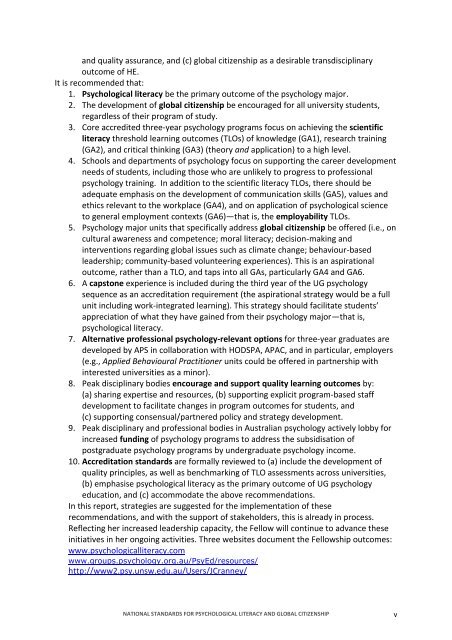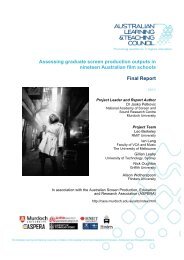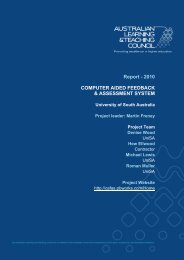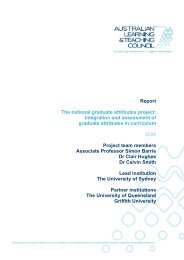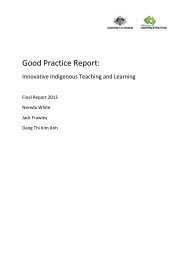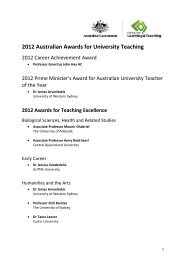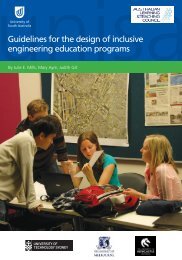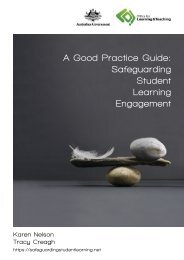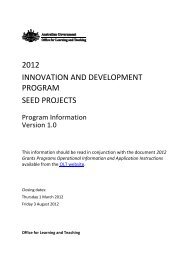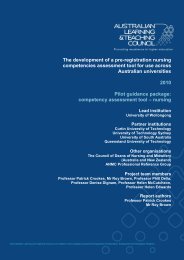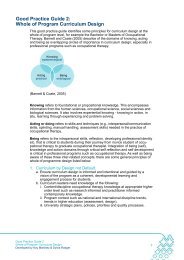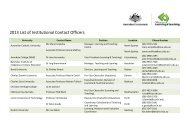national standards for psychological literacy and global citizenship
national standards for psychological literacy and global citizenship
national standards for psychological literacy and global citizenship
You also want an ePaper? Increase the reach of your titles
YUMPU automatically turns print PDFs into web optimized ePapers that Google loves.
<strong>and</strong> quality assurance, <strong>and</strong> (c) <strong>global</strong> <strong>citizenship</strong> as a desirable transdisciplinary<br />
outcome of HE.<br />
It is recommended that:<br />
1. Psychological <strong>literacy</strong> be the primary outcome of the psychology major.<br />
2. The development of <strong>global</strong> <strong>citizenship</strong> be encouraged <strong>for</strong> all university students,<br />
regardless of their program of study.<br />
3. Core accredited three-year psychology programs focus on achieving the scientific<br />
<strong>literacy</strong> threshold learning outcomes (TLOs) of knowledge (GA1), research training<br />
(GA2), <strong>and</strong> critical thinking (GA3) (theory <strong>and</strong> application) to a high level.<br />
4. Schools <strong>and</strong> departments of psychology focus on supporting the career development<br />
needs of students, including those who are unlikely to progress to professional<br />
psychology training. In addition to the scientific <strong>literacy</strong> TLOs, there should be<br />
adequate emphasis on the development of communication skills (GA5), values <strong>and</strong><br />
ethics relevant to the workplace (GA4), <strong>and</strong> on application of <strong>psychological</strong> science<br />
to general employment contexts (GA6)—that is, the employability TLOs.<br />
5. Psychology major units that specifically address <strong>global</strong> <strong>citizenship</strong> be offered (i.e., on<br />
cultural awareness <strong>and</strong> competence; moral <strong>literacy</strong>; decision-making <strong>and</strong><br />
interventions regarding <strong>global</strong> issues such as climate change; behaviour-based<br />
leadership; community-based volunteering experiences). This is an aspirational<br />
outcome, rather than a TLO, <strong>and</strong> taps into all GAs, particularly GA4 <strong>and</strong> GA6.<br />
6. A capstone experience is included during the third year of the UG psychology<br />
sequence as an accreditation requirement (the aspirational strategy would be a full<br />
unit including work-integrated learning). This strategy should facilitate students’<br />
appreciation of what they have gained from their psychology major—that is,<br />
<strong>psychological</strong> <strong>literacy</strong>.<br />
7. Alternative professional psychology-relevant options <strong>for</strong> three-year graduates are<br />
developed by APS in collaboration with HODSPA, APAC, <strong>and</strong> in particular, employers<br />
(e.g., Applied Behavioural Practitioner units could be offered in partnership with<br />
interested universities as a minor).<br />
8. Peak disciplinary bodies encourage <strong>and</strong> support quality learning outcomes by:<br />
(a) sharing expertise <strong>and</strong> resources, (b) supporting explicit program-based staff<br />
development to facilitate changes in program outcomes <strong>for</strong> students, <strong>and</strong><br />
(c) supporting consensual/partnered policy <strong>and</strong> strategy development.<br />
9. Peak disciplinary <strong>and</strong> professional bodies in Australian psychology actively lobby <strong>for</strong><br />
increased funding of psychology programs to address the subsidisation of<br />
postgraduate psychology programs by undergraduate psychology income.<br />
10. Accreditation <strong>st<strong>and</strong>ards</strong> are <strong>for</strong>mally reviewed to (a) include the development of<br />
quality principles, as well as benchmarking of TLO assessments across universities,<br />
(b) emphasise <strong>psychological</strong> <strong>literacy</strong> as the primary outcome of UG psychology<br />
education, <strong>and</strong> (c) accommodate the above recommendations.<br />
In this report, strategies are suggested <strong>for</strong> the implementation of these<br />
recommendations, <strong>and</strong> with the support of stakeholders, this is already in process.<br />
Reflecting her increased leadership capacity, the Fellow will continue to advance these<br />
initiatives in her ongoing activities. Three websites document the Fellowship outcomes:<br />
www.<strong>psychological</strong><strong>literacy</strong>.com<br />
www.groups.psychology.org.au/PsyEd/resources/<br />
http://www2.psy.unsw.edu.au/Users/JCranney/<br />
NATIONAL STANDARDS FOR PSYCHOLOGICAL LITERACY AND GLOBAL CITIZENSHIP<br />
v


